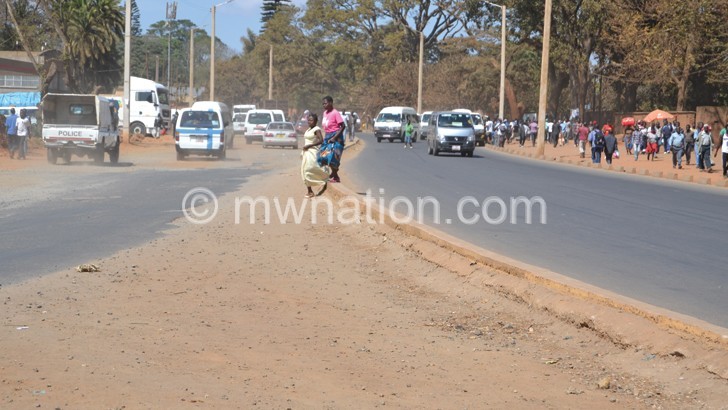Delayed projects remain a drain
In project management, a project is deemed successful if it is started and completed within the scheduled timeframe, on budget and according to specifications. When this happens, costs are saved.
However, in Malawi, such achievements remain a pipedream if findings of the Construction Sector Transparency Initiative (CoST) 2017 Assurance Report on Construction Projects launched in Lilongwe yesterday are anything to go by.
Tens of projects, notably roads and hospitals, remain uncompleted and in some cases yet to start over a decade after their initiation. These include the Phalombe District Hospital project, the Lirangwe-Chingale-Machinga Road, the Thyolo-Makwasa-Thekerani-Muona-Bangula Road, the Zomba-Jali-Phalombe-Chitakale Road and the 600-metre stretch of the dual carriageway between Illovo and Midima roundabouts in Limbe, among others.

In all cases, costs have either doubled or tripled. Most of the funding was also sourced from loans, a development that has increased the burden of repayment on taxpayers.
National Construction Industry (NCIC) technical director Gerald Khonje yesterday bemoaned poor filing systems, project cost overruns and delayed funding to locally funded projects as being the major factors affecting the construction sector in the country.
He said this has seen some projects stalling while others have been of poor quality and substandard.
Said Khonje: “Most procuring entities have centralised data, meaning, they are not properly managed and this is worrisome.”
The report also noted that locally funded projects, unlike those that are donor-financed, suffer a lot and have ended up being left out and abandoned.
The report has also highlighted the need for councils to involve expertise from the Roads Authority (RA) on road projects, citing the poor road standards in Lilongwe City.
Government, through the Roads Fund Administration (RFA), funded the council about K5.4 billion for rehabilitation of 12 roads within Lilongwe city. There were later concerns that some of the roads were of poor quality.
In the wake of this, the report says the money for the project and the compromised standards could have been avoided if LCC had considered the budget as a primary driver for designs.
Thus, they could have constructed fewer roads but of higher quality in line with the resource envelop.
In his reaction to the report, Malawi Economic Justice Network (Mejn) executive director Dalitso Kubalasa said accountable governance, transparency and accountability, particularly in the construction sector, is a pre-requisite for instant positive transformation of people’s livelihoods across the country.
He said if the country can be serious enough and follow best practices, it can make a difference to the country’s economic development agenda.
In an interview, NCIC chief executive officer Linda Phiri said currently they are working on quantifying the cost of such poor systems as their study only emphasised on finding system gaps.
She said: “It is true last time we came up with similar findings, and it’s the same now, the study now was to find out system gaps. We will come up with interventions to deal with cost later, but currently we are calling for capacity building in all procurement entities to improve in filling system and how they execute their job.”
With a rapidly growing population, Malawi still lacks adequate infrastructure, particularly in rural areas, where an overwhelming 88 percent of its population live.
The report covers disclosure of infrastructure data standards for 33 projects covering 10 procuring entities.
Engineer and project management consultant, Washington Chimuzu, said the reasons cited by the NCIC report were common and not just here in Malawi, but many other countries too.
In a written response, he said: “They are worrisome and I hope the report will be used to bring about some reforms in the way projects are handled across the board.
“In general, the reasons cited point towards poor or non-existent project management practices, low compliance to ethical standards and the absence of effective leadership, which is at the heart of good project management.”
CoST’s 2016 report validated The Nation’s month-long investigation which established that the project management crisis in Malawi is broader, deeper and, as shown, expensively entrenched, as scores of projects go off track.
Vice-President Saulos Chilima, who is the political champion of CoST, is on record as having expressed concern over the unplanned financial investments government makes on projects due to cost escalations.
The 2016 report revealed that almost all publicly-funded projects, which submitted disclosure reports, suffered non-payment, delayed payments and project cost overruns.
During last year’s report launch, the Vice-President proposed inclusion of a tracker of project duration and actual cost which should be activated halfway into the project implementation to check if costs would be on course or exceeded. n





